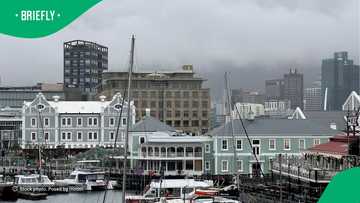Communities Challenge Offshore Oil Project Amid Legal Storm Over Environmental Authorisation
- Small-scale fishers and NGOs are challenging offshore drilling plans that threaten food security, culture and the ocean ecosystem
- The case cites a lack of climate risk assessment, missing spill plans and Shell’s disputed attempt to join with expired rights
- The Green Connection and Natural Justice shared a statement with Briefly News, highlighting the risks of offshore drilling and its environmental impacts
- Neville van Rooy, from The Green Connection, told Briefly News they took legal action against offshore drilling in Block 5/6/7 to defend marine life and coastal livelihoods
The Green Connection is a South African environmental justice NGO working to protect the oceans and secure the rights and livelihoods of coastal communities. Natural Justice is a legal non-profit working across Africa to defend the rights of communities impacted by environmental harm.
Last week, the Western Cape High Court became the latest arena in a long and bitter struggle that pits multinational oil interests against South Africa’s coastal communities. At stake is more than a contested Environmental Authorisation (EA); it is the question of whether small-scale fishers, many from historically marginalised communities, have any meaningful voice in decisions that threaten their way of life.

Source: Original
Plans to drill in block 5/6/7
The case, brought by civil society organisations The Green Connection and Natural Justice, challenges the 2023 approval of TotalEnergies’ plans to drill in Block 5/6/7, a rich offshore zone on which thousands depend for food, work, and cultural survival. The applicants argue that the approval process was deeply flawed, failing to assess climate risks, ignoring cross-border environmental consequences, and proceeding without even a basic blowout contingency plan.
PAY ATTENTION: stay informed and follow us on Google News!
Shell’s last-minute attempt to insert itself into the case, despite having no formal standing in the original application, has only sharpened concerns over governance failures.
Small-scale fisherman, Walter Steenkamp from the Northern Cape, pointed out that it is not only a legal battle:
“It’s a fight to defend our livelihoods, our culture, and the ocean that sustains us. We face so many challenges but yet we are excluded from decisions that directly impact our futures.

Read also
SA men transform dumping site into Gugulethu’s top takeaway restaurant and hopes to ease unemployment crisis
"Offshore oil and gas projects pose a huge threat to the marine ecosystems we rely on for food and income. But it’s not just about economics – fishing is in our blood.
"It’s who we are. Our traditions, our identity, and our knowledge of the sea have been passed down through generations. If we lose our ocean, we lose our heritage."
Africa month
The Green Connection’s Liziwe McDaid, from the Western Cape, links the timing of the hearings to Africa Month, drawing attention to the bitter irony: while African leaders call for justice and reparations, extractive projects continue to exploit communities without consent. Meanwhile, corporations seek to entrench their claims to resources they may no longer have a legal right to access.
According to McDaid, there is no legal basis for Shell to be joined to the proceedings, which challenge the government’s approval of TotalEnergies’ (TEEPSA) proposed offshore drilling activities.
“Shell was neither part of the original EA application nor has there been any lawful transfer of the authorisation to the Dutch multinational.
"In fact, according to our calculations, the exploration right has already lapsed. Shell’s claim to a right that we believe no longer exists undermines proper environmental governance,” McDaid said.

Read also
Cape Town’s infrastructure came under scrutiny after a viral TikTok showed widespread flooding in the city

Source: Original
Neville van Rooy, Community Outreach Coordinator at The Green Connection, told Briefly News the community was motivated to act against offshore drilling in Block 5/6/7 to protect the ocean and their livelihoods. He explained:
"Our love for the ocean and connection to our heritage from pre-colonial times. We have the right to a healthy ocean. We fear our oceans will be polluted like the Niger delta, and deep see horizon cases .
People build their livelihoods from the sea. Why are our voices being ignored and multinational industries being prioritised. From a climate change perspective this is a reckless decision to take when fossil fuels are once again prioritised."
South African law
Indeed, the legal technicalities matter here. South African law allows only three renewals of an offshore exploration right, each lasting two years. According to Natural Justice, that limit was reached in 2021.

Read also
South Africa secures $1.5 billion infrastructure loan from World Bank, SA worried it will be stolen
"Their third renewal application should not be permitted to hang in perpetuity, just because Total waited until their third renewal to apply for its environmental authorisation," Natural Justice Programme Manager Melissa Groenink-Groves said.
Appealing the decision
In 2023, an Environmental Authorisation was granted. After appealing the decision to the Minister of Forestry, Fisheries and the Environment, The Green Connection and Natural Justice filed a judicial review application in the Western Cape High Court in March 2024, challenging the actions of both the Director-General and the Minister.
In April this year (2025), Total filed a "joinder application", seeking to include Shell as a party in the legal proceedings concerning block 5/6/7.
“The Environmental Authorisation (EA) was granted without properly assessing the devastating impact an oil spill could have on small-scale fishers, without accounting for climate change, and without making oil spill contingency plans available as part of the environmental impact assessment process," Groenink-Groves said.
Fishers from the Northern and Western Cape have travelled to Cape Town to demand accountability, while others take action across the country. The court has reserved judgment. But the moral verdict is already evident. When governments ignore climate realities, sideline vulnerable voices, and prioritise foreign oil interests over local survival, they are not just risking environmental damage, they are deepening historic injustice.

Read also
“We’re Tired”: South Africa included in viral World War III safe haven list, sparks chatter
Disclaimer: The views and opinions expressed here are those of the author and do not necessarily reflect the official policy or position of Briefly News.
PAY ATTENTION: Follow Briefly News on Twitter and never miss the hottest topics! Find us at @brieflyza!
Source: Briefly News


